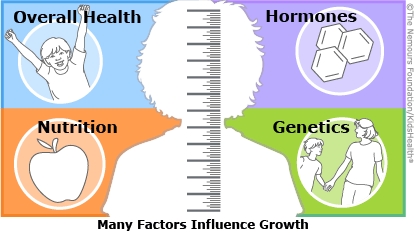Short Stature (Height): How to Care for Your Child
Children with short stature are shorter than other kids their age. Often, this is just a normal inherited (genetic) growth pattern. But hormone problems, poor nutrition, and illnesses also can lead to short stature. Health care providers can do tests to find out the cause of a child's short stature.


Follow your health care provider's instructions for:
-
any changes to your child's diet
-
getting any lab work
-
getting any X-rays or other tests
-
going to any specialists, such as an endocrinologist (hormone doctor)
-
when to follow up

You have any questions about your child's growth.

What causes short stature? Short stature can be due to:
-
familial short stature (when being short runs in the family)
-
constitutional growth delay ("a late bloomer")
-
poor nutrition
-
hormone problems, such as an underactive thyroid or not enough growth hormone
-
genetic syndromes, such as Down syndrome and some forms of dwarfism
-
chronic illnesses, such as Crohn's disease, that make it hard to get enough nutrients from food
-
long-term treatment with steroid medicines
Sometimes the cause isn't known. This is called idiopathic short stature.
Can short stature be treated? It depends on the cause and when the short stature is found. If a child doesn't get enough nutrition or takes steroids for a long time, improving nutrition or stopping the medicines can lead to some catch-up growth. Other treatments may include thyroid or growth hormone medicines.